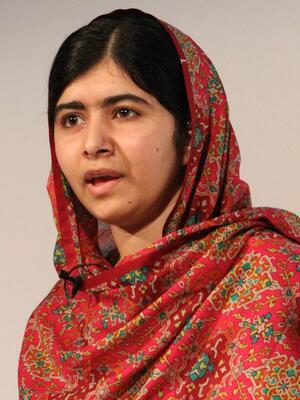Getting Girls Educated
When I was in eighth grade, my social studies teacher made a passing remark about a Pakistani girl who was shot at by the Taliban. It was one of those this isn’t in the curriculum but hey, I thought you should know moments that I always appreciate from an educator. She sent us a link to the girl’s anonymous diary from 2009, and as I scrolled through the terrifying descriptions of the daily life of a girl trying to get an education while living under Taliban rule, her bravery and passion inspired me. I realized how much I had taken my education for granted. It was easy enough for me to complain about school when I had to get up at 6am each morning to catch the bus and I had to stay up late to finish homework I didn’t want to do, but when I read this story of a girl risking her life each day to learn, I realized that school wasn’t a burden. I was lucky to have school.
At the end of last year, that girl—Malala Yousafzai—became the youngest person and the first Pakistani to receive the Nobel Peace Prize. I watched her heart-wrenching acceptance speech on Youtube and was reminded of the first time I heard of her, when I was an awkward middle-schooler with a burgeoning sense of feminism and a cautious interest in civil rights. Her speech was not only passionate and eloquent, but also extremely humanizing. “I’m pretty certain that I’m also the first recipient of the Nobel Peace Prize who still fights with her younger brothers,” she says in accented English, and the audience laughs. She makes a point of emphasizing that she is not a superhero or an angel; she’s just a teenager with some ideas about how the world should be and supportive family and friends who are helping her turn those ideas into a reality. To me, her speech feels like a call to action. She’s only seventeen years old, she still gets into dumb arguments with her brothers; yet, Malala has already received numerous awards for her work in getting all children educated and for her fight against the oppression of young people. Watching her I can’t help but think, “if she can change the world at such a young age, why can’t I?”
Western feminists have a habit of writing about and advocating for “first world” issues: body image, television and gaming tropes, the wage gap, you name it. It’s logical to be most concerned with the society in which you live and on which you have the most influence, and there’s nothing wrong with this reality. These issues are not made less relevant by the fact that there are bigger issues out there. But it’s also important to acknowledge that we live in a global society, and feminism is about more than just what’s going on “over here.” In countries like Pakistan and Saudi Arabia, women still fight for rights that most Americans take for granted. Plenty of feminist and human rights organizations (including, of course, the Malala Fund) fight to put an end to gender inequality in those countries where it is most rampant. I can’t help feeling that the feminist bloggers and perpetually-outraged privileged people of the world (myself included) need to talk about those injustices just a little bit more.
In her Nobel acceptance speech, Malala reminds her audience that, “the very first word of the holy Koran is the word Ikrah, which means read.” Muslims, like Jews, are “people of the book.” Our cultures are centered around learning and study, our lives are guided by holy words written in holy books, and our faiths are rooted in the beauty of education. The Malala Fund is a cause worth advocating for, donating to, volunteering for, or simply explaining to a group of eighth graders in a classroom. We—as Jews, as Feminists, and as human beings—must help make sure all children, regardless of their gender or location, have access to the education they need to change the world.
This piece was written as part of JWA’s Rising Voices Fellowship.







